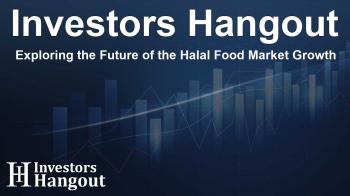Exploring the Future of the Halal Food Market Growth

Overview of the Halal Food Market's Growth Potential
The Halal Food market has become an increasingly vital segment of the food industry, with estimates predicting significant growth over the coming years. Recent studies reveal that the market was valued at around USD 1.76 billion recently and is poised to reach approximately USD 2.11 billion in the near future. By 2034, projections show that it could swell to USD 3.97 billion, reflecting an impressive compound annual growth rate (CAGR) of approximately 7.45%. This growth is largely driven by a combination of rising demand and increased awareness regarding halal standards.
Drivers of Market Growth
Demand from a Growing Muslim Population
One major factor supporting the expansion of the Halal Food market is the steadily increasing global Muslim population. As more consumers become aware of halal certifications, the search for high-quality, ethically produced food has intensified. The awareness surrounding halal practices is extending beyond the Muslim community, attracting individuals seeking healthier and more ethical food options.
Regional Growth Trends
In particular, the Asia-Pacific region illustrates an exceptionally dynamic growth rate in the demand for halal food, fueled by its significant Muslim populations in countries such as Indonesia, Malaysia, and Pakistan. With the support of local governments advocating for halal certifications and favorable export policies, the region stands as a powerhouse for production and consumption of halal products.
The Emerging Role of Technology
The rise of online platforms and e-commerce has also fundamentally transformed the halal food market. Younger, tech-savvy consumers are increasingly relying on online channels for accessing halal products. Retail giants such as Amazon have expanded their offerings to include halal sections, allowing for easier access to halal-certified foods, which fosters transparency regarding food sourcing and quality.”
Impact of E-commerce
E-commerce not only facilitates the purchase of halal products but also provides consumers with substantial information about certifications and food origins. The online space is rapidly becoming a primary avenue through which consumers engage with halal products, making e-retailers vital players in this segment.
Market Segmentation and Key Players
The halal food market is diverse, encompassing a wide range of products from meat, poultry, and seafood to dairy products, beverages, and nutraceuticals. To effectively capture market share, companies are focusing on product differentiation, ensuring that offerings meet specific halal standards that consumers trust.
Prominent Companies in the Industry
- Nestlé S.A.
- Cargill Incorporated
- BRF S.A. (Sadia and Perdix brands)
- Al Islami Foods
- DagangHalal Group
Market Challenges
Despite substantial growth opportunities, the halal food market faces challenges including stringent regulations and the need for consistent quality assurance across different regions. Continued collaboration among industry stakeholders, including government agencies and certification organizations, is essential to overcome hurdles and bolster consumer confidence.
Consumer Trust and Market Integrity
Building consumer trust hinges largely on the integrity of halal certifications and the transparency of production practices. Thus, companies must ensure their products not only comply with halal standards but also resonate with evolving consumer preferences for healthy and ethically sourced food.
Future Outlook and Conclusion
As the halal food market continues on its upward trajectory, companies will have to adapt swiftly to changing consumer demands and preferences, devising innovative strategies for product offerings. The combination of market growth potential, increased consumer awareness, and technological advancements sets the stage for a thriving and competitive halal food industry.
Frequently Asked Questions
1. What is the current market size of the halal food industry?
The halal food market is currently valued at around USD 1.76 billion and expected to reach USD 2.11 billion shortly.
2. What factors contribute to the growth of the halal food market?
Growth is driven by an increasing global Muslim population, heightened awareness of halal standards, and consumer trends leaning towards ethical dining.
3. Which regions are leading in halal food consumption?
The Asia-Pacific region is notable due to its large Muslim populations, with countries like Indonesia and Malaysia showing robust market growth.
4. What challenges does the halal food market face?
Challenges include regulatory constraints, the need for consistent quality assurance, and the importance of maintaining consumer trust in halal certifications.
5. Who are the key players in the halal food market?
Prominent companies include Nestlé, Cargill, BRF, Al Islami Foods, and DagangHalal Group, among others, that focus on meeting consumer demands for halal products.
About The Author
Contact Riley Hayes privately here. Or send an email with ATTN: Riley Hayes as the subject to contact@investorshangout.com.
About Investors Hangout
Investors Hangout is a leading online stock forum for financial discussion and learning, offering a wide range of free tools and resources. It draws in traders of all levels, who exchange market knowledge, investigate trading tactics, and keep an eye on industry developments in real time. Featuring financial articles, stock message boards, quotes, charts, company profiles, and live news updates. Through cooperative learning and a wealth of informational resources, it helps users from novices creating their first portfolios to experts honing their techniques. Join Investors Hangout today: https://investorshangout.com/
The content of this article is based on factual, publicly available information and does not represent legal, financial, or investment advice. Investors Hangout does not offer financial advice, and the author is not a licensed financial advisor. Consult a qualified advisor before making any financial or investment decisions based on this article. This article should not be considered advice to purchase, sell, or hold any securities or other investments. If any of the material provided here is inaccurate, please contact us for corrections.

